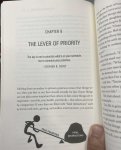
The 7 Habits of Highly Effective People" by Stephen R. Covey is a self-help book that offers a comprehensive framework for personal and professional effectiveness. Covey identifies seven habits that individuals can cultivate to achieve success and fulfillment. Here's a detailed breakdown:
- Be Proactive: Covey emphasizes taking responsibility for your actions and attitudes. Being proactive means focusing on what you can control and influence rather than reacting passively to external circumstances.
- Begin with the End in Mind: Start with a clear understanding of your desired destination, whether in personal goals or professional aspirations. Covey emphasizes the importance of having a personal mission statement that guides your actions.
- Put First Things First: This habit revolves around time management and prioritization. Covey urges readers to identify and prioritize important tasks over urgent but less crucial ones. His quote about scheduling priorities exemplifies this principle.
- Think Win-Win: Covey promotes a mindset that seeks mutual benefit in interactions and relationships. Instead of a zero-sum game, he encourages finding solutions where all parties involved can benefit.
- Seek First to Understand, Then to Be Understood: Effective communication is key. Covey emphasizes the importance of empathetic listening before expressing one's own thoughts, leading to better understanding and more meaningful conversations.
- Synergize: Encouraging teamwork and collaboration, Covey highlights the power of synergy—where the collective strength of a group produces better results than individual efforts.
- Sharpen the Saw: Continual improvement is essential. Covey advocates for balanced self-renewal in four dimensions: physical, mental, emotional, and spiritual.
The concept of "scheduling priorities, not prioritizing what's on your schedule" underscores the idea that true effectiveness comes from consciously allocating time and energy to what truly matters most in alignment with your values and long-term goals.
